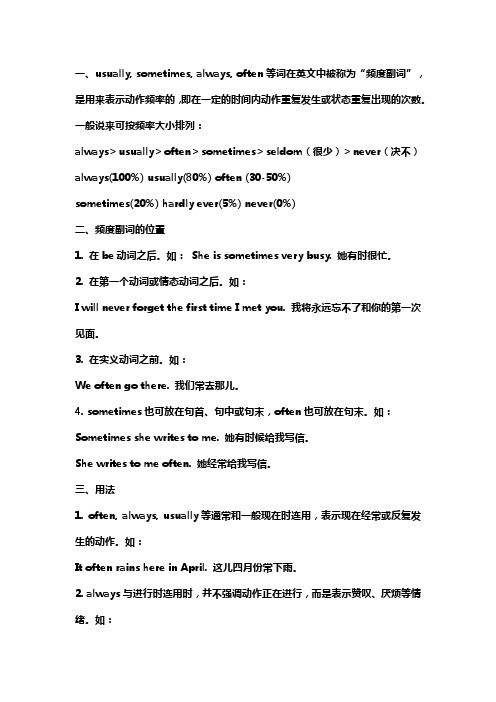初二英语一般现在时 频率副词
2020暑假预习:初中英语8年级上册unit2 语法专项---频率副词 (含习题)

unit2 语法专项---频率副词等(含习题)频率副词概念:是表示某事发生频率的副词,即用来表示某事在一段时间内所发生的次数。
always,usually,often,sometimes,hardly,never,是英语中最常见的几个频率副词。
位置:一般放在行为动词之前,be动词、助动词及情态动词之后。
辨析:含义和程度的区别always的频率是100%,意为“总是;永远地”。
usually的频率是70%左右,意为“通常;平常”。
often的频率是50%左右,意为“常常”。
sometimes的频率是20%左右,意为“有时”。
hardly的频率是5%左右,意为“几乎不;简直不”。
never的频率为0,意为“从来不;永不”。
always > usually > often > sometimes > hardly > never其他:一些表示频率的词组,如once a week,twice a month,three times a year,four timesa year等,它们准确地表达出事情发生的频率。
我每天喝牛奶,吃蔬菜。
I drink milk and eat vegetables every day.我每周锻炼一次。
I exercise once a week.我一年去看望我奶奶四次。
I visit my grandmother four times a year.拓展:1.辨析:how often/how soon/how long/how far的区别2.辨析:sometimes,sometime,some times,some time的区别sometimes频度副词。
意为“有时”,多用于一般现在时,对它进行提问常用how often sometime:副词,意为“在某时(过去或将来)”,表示的是不确切或尚末确定的时间。
对它提问用when。
some times:名词短语。
一般现在时的用法及常见句型总结

一般现在时的用法及常见句型总结一般现在时是英语中最基础也最常用的时态之一,用来描述经常发生的事情、客观真理、现有的状态或习惯性的行为。
下面将总结一般现在时的用法和常见句型,并通过例句进行说明。
1. 表示经常发生的动作或习惯性行为:例句:- I usually go to the gym on Mondays and Wednesdays.(我通常在周一和周三去健身房。
)- She always drinks a cup of tea before going to bed.(她睡觉前总是喝一杯茶。
)2. 表示客观真理或普遍事实:例句:- Water boils at 100 degrees Celsius.(水在100摄氏度沸腾。
)- The Earth revolves around the sun.(地球围绕太阳转动。
)3. 表示现有的状态或特征:例句:- I live in New York.(我住在纽约。
)- The sky is blue.(天空是蓝色的。
)4. 使用频率副词表达动作发生的频率:例句:- They often play soccer on weekends.(他们经常在周末踢足球。
)- He rarely eats fast food.(他很少吃快餐。
)5. 使用时间状语表明动作发生的时间:例句:- She wakes up early every morning.(她每天早上都早起。
)- We usually have dinner at 7 o'clock.(我们通常在7点吃晚饭。
)6. 使用第三人称单数动词时,要加上"-s"或"-es":例句:- He runs in the park every evening.(他每晚在公园里跑步。
)- She teaches English at a high school.(她在一所高中教英语。
一般现在时时间状语的用法

一般现在时时间状语的用法一般现在时(Simple Present Tense)是英语中最基本的时态之一,用来描述经常性、习惯性、现实性的动作或状态。
在一般现在时中,时间状语(Time Adverbials)扮演了重要的角色,它们用来限定动作发生的时间。
时间状语可以是单个词或是一个短语,在句子中常常位于主语和谓语之间。
下面将详细介绍一般现在时中时间状语的用法。
一、常见的时间状语在一般现在时中,我们常用的时间状语可以分为几类:频率副词、具体时间副词、时间段副词、时间状语从句等。
这些时间状语能够帮助我们界定动作发生的时间,让句子更加具体和清晰。
1. 频率副词(Adverbs of Frequency)频率副词用来表示动作发生的频率,常见的频率副词包括:always(总是)、usually (通常)、often(经常)、sometimes(有时候)、seldom(很少)、rarely(很少)、never(从不)等。
它们在句子中通常位于谓语动词之前。
例如:- I always drink a cup of coffee in the morning.- She usually goes to the gym after work.- They never eat fast food.2. 具体时间副词(Specific Time Adverbs)具体时间副词用来表示动作发生的具体时间,例如:today(今天)、tomorrow(明天)、yesterday(昨天)、tonight(今晚)等。
它们在句子中可以直接修饰动词。
例如:- I have a meeting tomorrow morning.- They often go for a walk in the park on Sundays.3. 时间段副词(Time Period Adverbs)时间段副词用来表示动作发生的时间跨度,常见的时间段副词包括:every day(每天)、once a week(一周一次)、twice a month(一个月两次)、three times a year(一年三次)等。
八年级英语上册unit2频度副词

八年级英语上册unit2频度副词一、常见的频度副词有以下这些:always(总是)usually(通常)often(常常,经常) sometimes(有时候) never(从不)usually, sometimes, always, often等词在英文中被称为“频度副词”,是用来表示动作频率的,但程度上有别。
一般说来可按频率大小排列:always>usually>often>sometimes>seldom(很少)>hardly ever>never(从不)二、频度副词的位置:肯定句中:1. 在be动词之后,第一个助动词或情态动词之后。
She is sometimes very busy. 她有时很忙。
2. 在实义动词之前。
如:We often go there. 我们常去那儿。
3. sometimes也可放在句首、句中或句末,often也可放在句末,用来表示强调。
Sometimes she writes to me. 她有时候给我写信。
否定句中: 1. 频度副词usually和often可位于否定词not之前或之后。
They don’t often hold such parties. 他们不常开这样的晚会。
2. 频度副词always总是位于否定词之后,不可位于否定句之前。
Things are not always what they seem to be. 外表往往是靠不住的。
3. 频度副词sometimes总是位于否定词之前,不可位于否定词之后。
Jim is sometimes not very punctual. 吉姆有时不太准时。
三、用法:1. often, always, usually等通常和一般现在时连用,表示现在经常或反复发生的动作。
如:It often rains here in April. 这儿四月份常下雨。
2. always与进行时连用时,并不强调动作正在进行,而是表示赞叹、厌烦等情绪。
英语中频率副词的用法

一、usually, sometimes, always, often等词在英文中被称为“频度副词”,是用来表示动作频率的,即在一定的时间内动作重复发生或状态重复出现的次数。
一般说来可按频率大小排列:always>usually>often>sometimes>seldom(很少)>never(决不)always(100%) usually(80%) often (30-50%)sometimes(20%) hardly ever(5%) never(0%)二、频度副词的位置1. 在be动词之后。
如:She is sometimes very busy. 她有时很忙。
2. 在第一个动词或情态动词之后。
如:I will never forget the first time I met you. 我将永远忘不了和你的第一次见面。
3. 在实义动词之前。
如:We often go there. 我们常去那儿。
4. sometimes也可放在句首、句中或句末,often也可放在句末。
如:Sometimes she writes to me. 她有时候给我写信。
She writes to me often. 她经常给我写信。
三、用法1. often, always, usually等通常和一般现在时连用,表示现在经常或反复发生的动作。
如:It often rains here in April. 这儿四月份常下雨。
2. always与进行时连用时,并不强调动作正在进行,而是表示赞叹、厌烦等情绪。
如:He is always thinking of others. 他总是想着别人。
(赞叹)She is always asking silly questions. 她老是问些愚蠢的问题。
(厌烦)3. 对这些频度副词提问时,用how often。
如:I write to my brother sometimes.How often do you write to your brother?。
英语语法课件---频率副词

频度副词的使用:
(2) 频率副词放在be动词,情态动词或助动词之后
例子:
(1) She is always ready to help others. (2) My parents have never been to Beijing.
频度副词的使用:
(3) 频率副词常与一般现在时一起使用
例子:
sometimes的频度是20%左右,意为“有时,不时”。 seldom的频度是10%左右,意为“很少”。
hardly ever的频度是5%左右,意为“几乎不;简直不”。 never的频度是0%,意为“从不,决不,总是不”。
频度副词:
(1) always 表示的频率为100% :"总是、 一直、始终"
Байду номын сангаас
频度副词:
(3) often 表示的频率为60%-70%:"经常"、"常常"
例子:
(1) Do you often write to them? (2) Does Fred come here often?
频度副词:
(4) sometimes 表示的频率为30%-50%:“有时、不时”
例子:
(1) Sometimes they play football on Saturday afternoon. (2) Fred sometimes plays chess at the weekends.
例子:
(1) I always do my cleaning on Sundays. (2) My mother always goes shopping on Fridays.
频度副词:
(2) usually 表示的频率为70%-80%:"通常"
一般现在时的用法及示例
一般现在时的用法及示例一般现在时是英语中最基本的时态之一,用于描述经常发生的动作、现实存在的情况、不变的真理以及科学事实等。
本文将详细介绍一般现在时的使用规则,并给出相应的示例。
一、一般现在时的基本形式一般现在时的动词形式为原形,即不带任何时态标志的动词。
它适用于第三人称单数和其他人称的主语。
示例:1. I eat dinner at 7 PM every day.(我每天晚上7点吃饭。
)2. She walks to work every morning.(她每天早上步行去上班。
)3. They play basketball on Saturdays.(他们每个星期六打篮球。
)二、一般现在时的用法1. 描述经常性的动作或习惯一般现在时常用于描述经常发生的动作或习惯,表示事件的惯常性。
示例:1. He usually drinks coffee in the morning.(他通常早上喝咖啡。
)2. We often go to the park on weekends.(我们经常在周末去公园。
)3. Mary always reads books before going to bed.(玛丽睡觉前总是看书。
)2. 表示现实存在的情况一般现在时还用于描述现实存在的情况,即事实或状态。
示例:1. The sun rises in the east.(太阳从东方升起。
)2. Water boils at 100 degrees Celsius.(水在100摄氏度沸腾。
)3. Dogs are loyal animals.(狗是忠诚的动物。
)3. 表示客观真理或普遍事实一般现在时还可以用于表达客观真理或普遍事实,即通常情况下普遍适用的陈述句。
示例:1. The Earth revolves around the sun.(地球绕太阳旋转。
)2. Plants need sunlight to grow.(植物需要阳光才能生长。
频率副词有多‘频‘
频率副词有多“频”频率副词是表示动作发生的频率,多与一般现在时连用。
频率副词是一般现在时的“标志词”,它们是表示频率的副词。
这些词表示经常性动作或情况,不是某一具体动作,常用于一般现在时。
这些频率副词在句子中的位置比较灵活,可以用于句首、句中和句末。
在句中的位置一般在系动词be,情态动词或助动词之后,行为动词之前,在表示动作发生的频率程度上可这样表示:always>usually>often>sometimes 。
1.100﹪always意为“总是,一直;始终”。
这是频率最大的词,表示动作重复,状态继续,中间没有间断。
如:Mary is always late for school.玛丽总是上学迟到。
He always comes late. 他总是迟到。
2.90﹪usually意为“通常,经常”,表示习惯动作,频率仅次于always,相当于most often。
表示除个别情况外,基本上没有变化。
如:He usually gets up at 6 o'clock.他通常6点钟起床。
I usually go to bed at 10:00. 我通常10点钟睡觉。
3.70﹪often意为“时常,经常,常常”,表示动作重复,中间有间断,表示发生的频率比usually要小,但比sometimes要大。
如:I often go to school by bike,but sometimes I go to school by bus.我经常骑自行车上学,但有时乘公共汽车去。
They often clean the classroom after school. 他们常常在放学后打扫教室。
4.40﹪sometimes意为“有时”,表示发生的频率最小。
sometimes一词在书写时要十分小心,若分开写成some times就成了“好几次,数次”。
sometimes的位置较为灵活,可位于句首、句中或句末。
人教版初二英语八年级上册Unit2知识点
人教版初二英语八年级上册Unit2知识点Unit2 How often do you exercise?【重点语法】1. 频率副词: always,usually, often, sometimes, never频率副词在句中通常放在实义动词之前, be动词或助动词之后。
常用于一般现在时态中。
2.“次数”的表达方法一次once,两次twice,三次或三次以上:基数词+ times, 如:three times, five times,3. how often“多久一次”问频率,回答常含有频率词组或短语。
常见的how疑问词:1)How soon 多久(以后)—How soon will he be back?他多久能回来?—He will be back in amonth. 他一个月后能回来。
2)how long “多久”—How long did it take you toclean the house? 你打扫房子用了多久?—It took me half an hour to cleanthe house. 我打扫这房子用了半小时。
3)How many+名复How much+不可名“多少” 问数量(how much 还可问价格)【重点短语】1. go to the movies 去看电影2. look after = take care of 照顾3. surf the internet 上网4. healthy lifestyle 健康的生活方式5. go skate boarding 去划板6. keep healthy=stay healthy 保持健康7. eating habits 饮食习惯8. take more exercise 做更多的运动9. the same as 与什么相同10. be different from 不同11. once a month一月一次12. twice a week一周两次13. make a difference to 对......有影响/作用14. most of the students=moststudents15. shop=go shopping=do someshopping 购物16. be good for 对......有益17. be bad for 对......有害18. come home from school放学回家19. of course = certainly = sure 当然20. get good grades 取得好成绩21. keep/be in good health 保持健康22. take a vacation 去度假【词语辨析】1.maybe / may bemaybe 是副词,意为“大概,可能,或许”,一般用于句首。
英语中的频率副词
频率副词:一般用来表示动作发生的频率。
一般放在be动词之后或者助动词与主要动词之间但sometimes、often等还可以放在句首或句尾,usually可放在句首,once可放在句尾,twice、three times等一般放在句尾。
如:Sometimes I get up early.(我有时起得早)/ The workers usually have lunch at the factory.(工人们通常在厂里吃午饭) / Take this medicine twice a day.(这种药一天吃两次)1.频率副词是表示与次数,频率有关的副词,如:always(总是), usually(通常),frequently(经常)often (经常)sometimes(有时), seldom(不常),rarely(极少),never(从不)once(一次), twice(两次),等。
2.频率副词等级:all the time 100%;almost , always 90%;generally , usually 80%;often , frequently 60-70%;as often as not 40-50%;sometimes , at times 20-30%;occasionally , from time to time 10%;hardly , seldom , rarely 5%;never 0%。
3.频率副词用在be动词后。
He always gets up at 6:30.他经常六点半起床。
4.频率副词用在主要动词前。
My father usually walks home.我的父亲经常步行回家。
5.频率副词用在助动词与实义动词之间。
I will always love you.我将永远爱你。
6.频率副词用在ought to之间。
You ought often to write to your mother.你应该常给你母亲写信。
- 1、下载文档前请自行甄别文档内容的完整性,平台不提供额外的编辑、内容补充、找答案等附加服务。
- 2、"仅部分预览"的文档,不可在线预览部分如存在完整性等问题,可反馈申请退款(可完整预览的文档不适用该条件!)。
- 3、如文档侵犯您的权益,请联系客服反馈,我们会尽快为您处理(人工客服工作时间:9:00-18:30)。
Don’t push me! 别催我!
1
第三节 本节目标: 一般现在时 分辨频率副词 积累词汇\句型
一、一般现在时 1.掌握第三人称单数的变化: be动词 & 助动词 & 普通动词 2.掌握一般疑问句、对频率副词的提问
即学即练: 1.He often ________(have) dinner at home. 2.We often ___________ (play) in the playground 3.Liu Tao __________ (do) not like PE 4.What day __________ (be) it today? --- It’s Saturday 5.Daniel and Tommy _______(be) in Class One 6.The child often _______(watch) TV in the evening 7.She doesn’t __________ her homework in the afternoon. A. doing B. to do C. does D. do 8.______ you usually late for school? No, _____________. A. Do ; I am B. Does ;not C. Are ; I’m not D. Are ; I aren’t
9.He can ______ Chinese and English. A. speak. B. speaks . C. tell. D. say 10.The elephant likes______her friends and _____grass. A. play with , eat B. play with, eats C.to play with , eat D. to play with , eats 11.Mingming usually waters the flowers every day. 否定句: _____________ __ _ 一般疑问句: ________ ___ __ 划线提问 _______ ______ 12. She is always a good student.(改为一般疑问句,作否定回答)
13.These three girls like Barbie.(改成一般疑问句) 14.Tim stays up late twice a week.(就画线部分提问)
15.__________ you _________(brush) your teeth every morning Don’t push me! 别催我!
2
二、频率副词 1.在句中的位置:位于be动词、助动词之后,行为动词之前 2.给它们排序:often 、hardly ever 、never 、always 、usually 、sometimes > > > > >
即学即练: 1.The sun rises in the west. (never) 太阳从来不在西边升起
2. She is on time.( never) 她从来不守时 3. Your grandparents go out for a walk. (hardly)你的爷爷奶奶几乎不出去散步 4.—How often does your sister surf the Internet? —About A. three time B. three times C. three time every day D. three times a day 5.— does it take you to watch TV? — About forty minutes. A. How long B. How much C. How often D. How many 6.—How does he get to work? —He a bike. —How long does it him to get from home to the office? —It him 20 minutes. A. rides; takes; takes B. rides; take; takes C. ride; takes; takes D. ride; take; takes 7.---I didn’t know you take a bus to school.
---Oh, I ______ take a bus, but it is snowing today.
A. hardly B. never C. sometimes D. usually 8.----Miss Gao is very popular with her students. ----Yes. Her classes are ______ lively and interesting. A. seldom B. never C. sometimes D. always 9.-----How often do you go to a concert? -----______ ever. I’m not interested in that at all. A. Usually B. Hardly C. Almost 10.My friend likes singing and talking with others. But I often stay at home to watch TV. So my friend is( )than me. A. seriouser B. more serious C. calmer D. more outgoing Don’t push me! 别催我!
3
三、看图填空 The first Tree Planting Day was in the year 1987 in our country. Every year, on _________ 12th, office workers, soldiers, students and old people go out to plant trees. It was Planting Day last Sunday; our class went to plant trees. We __________ at the school gate at seven in the morning. Then we went to a park about five kilometers _________ from our school by bus. ____ we arrived, we started to work at once. A bus brought many young trees to the park. We took them from the bus, and carried them to the right place. We worked in pairs. We took turns to _________ holes in the ground. It was hard work, but we enjoyed it. When the holes were deep ____________, we __________ the young trees in them, and then ___________ them again. After that we got water from a river, and _____________ the trees. At the end of the day, we had ___________ over three hundred trees.
四、完形填空 One day, a Chinese student goes to study English in England. His family name is Sun. It is the 1 as the word "sun." England is a country with 2 . It is often cloudy or misty(多雾的), and it 3 again, so the days there 4 get much sunshine(阳光) all the year. When the Chinese student gets to London, a tall 5 policeman with a long face 6 his passport(护照) to check(检查) it. The policeman finds the Chinese name "sun" in the passport. He 7 its pronounced(发音) just like the 8 word "sun". So he says to the Chinese student, "Your name is Sun, you're wanted here. You bring sunshine 9 England, so we don't want you to 10 ." They smile.
( )1. A.same B.different C.like D.as ( )2. A.good weather(天气) B.bad people C.bad weather D.good people ( )3. A.rains B.raining C.is rains D.to rains ( )4. A.don't B.doesn't C.also D.often ( )5. A.Chinese B.China C.English D.Japanese ( )6. A.is open B.opens C.opening D.to open ( )7. A.think B.thinking C.to think D.thinks ( )8. A.English B.Chinese C.Japan D.French ( )9. A.at B.of C.to D.for ( )10. A.go away B.goes away C.going away D.away
